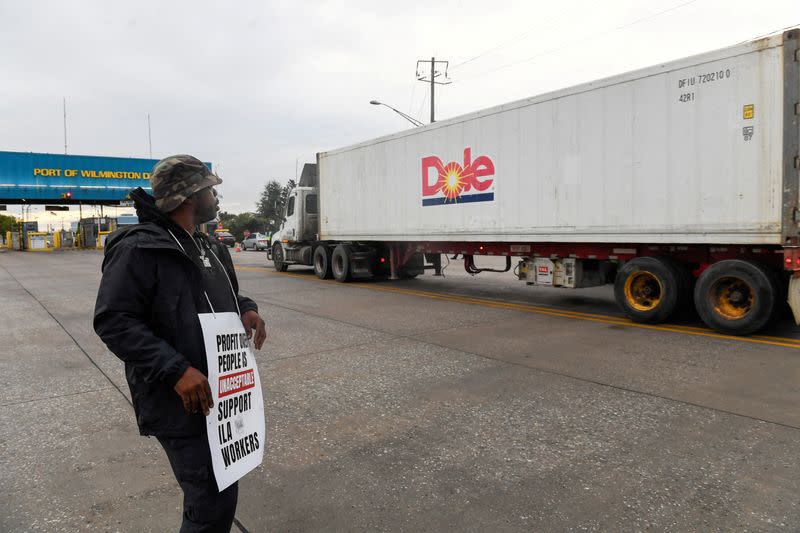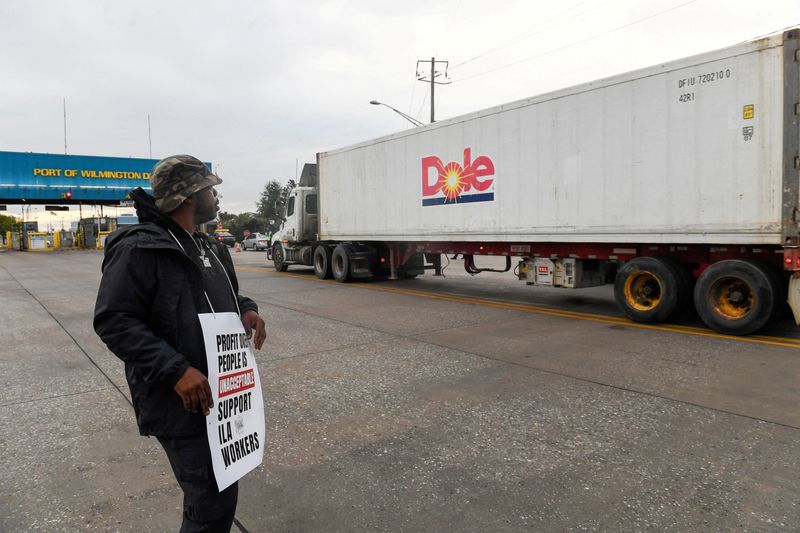By Tom Polansek and PJ Huffstutter
CHICAGO (Reuters) – Dockworkers striking at U.S. East Coast and Gulf Coast ports are preventing beef imports that restaurants and retailers increasingly rely on to make hamburgers because of limited domestic supplies, traders and industry members said.
The labor strike prevented everything from car shipments to containers filled with Guatemalan bananas and Italian wine from loading or unloading at dozens of ports from Maine to Texas. Along with beef, US seafood imports and chicken exports were disrupted.
Even a short-term disruption to shipments could affect the broader U.S. food supply chain, according to experts and food importers. If the strike continues, the result will be a shortage of some food products, price inflation or both, he said.
More than 50 container ships have docked at or around dozens of East Coast and Gulf ports since Wednesday, compared with just three on Sunday before the attack, according to Reuters and Everstream Analytics shipping data.
“From a supply chain perspective, it’s a nightmare,” said Jason Miller, interim chair of Michigan State University’s supply chain management department.
The beef sector could see a ripple effect if the strike disrupts imports for more than a week, industry members say.
U.S. beef supplies are tight after drought and high grain prices prompted ranchers to sell cattle, shrinking herds to the lowest level in decades.
The decline in the cattle population has led to higher U.S. beef prices and lower imports. Beef imports from Australia rose 72% through July this year, according to US Department of Agriculture data. Imports from New Zealand and Brazil also increased.
In anticipation of the attack, suppliers to U.S. grocers and fast-food restaurants are importing frozen lean beef imports mixed with domestic supplies to make hamburger meat, three industry members said.
Dan Sorbello, who imports beef to the Port of Philadelphia and Houston, said he unloaded the container from the boat faster than normal ahead of the attack to ensure that he could take possession of the meat and distribute it.
“We have got ourselves maybe worth a week’s lifeline,” said Sorbello, principal for Sorbello Refrigerated Services.

SURF AND TURF
PanaPesca USA LLC, which imports and exports seafood, also provided additional supplies of squid and clams to meet customers’ needs before the attack, chief commercial officer Eric Buckner said.
Many of PanaPesca’s products in frozen cargo containers have arrived, but some are still stuck on ships currently offshore, he said.
The strike could increase costs for fast-food restaurants if it lasts more than a week, said Bob Chudy, a consultant for beef importing companies.
“Suddenly, fast food chains that rely on cheaper lean meats from overseas will be forced to turn to domestic alternatives,” Chudy said.
McDonald’s Corp (MCD) and Burger King, owned by Restaurant Brands International (QSR), did not respond to requests for comment.
Beef importers could face demurrage charges if the strike persists, costs that could be passed on to consumers, analysts said. Refrigerated shipments of fresh meat, which can be used in restaurant dishes like fajitas, risk spoilage, he said.
U.S. retail prices for beef in August hit a record high of $5.58 per pound, according to the latest federal data available.
For the U.S. chicken industry, which depends on exports, the strike is also ill-timed, said Matt Busardo, Expana’s commodity information team leader for U.S. poultry.
Domestic demand is slowing as consumers switch to eating cold foods like roasts and chili, instead of fried chicken, he said. The sector relies on ports such as Savannah to export tribes and drumsticks to countries including Angola and Cuba.
(Reporting by Tom Polansek and PJ Huffstutter; Editing by Andrea Ricci)




